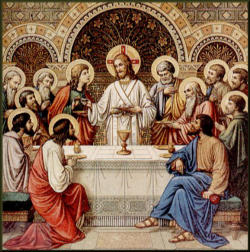 After all the people had been baptized and Jesus also had been baptized and was praying, heaven was opened (Luke 3:21); He was praying in a certain place, and when he had finished, one of his disciples said to him, “Lord, teach us to pray just as John taught his disciples.” He said to them, “When you pray, say: Father, hallowed be your name, your kingdom come. Give us each day our daily bread. (Luke 11: 1-3);
After all the people had been baptized and Jesus also had been baptized and was praying, heaven was opened (Luke 3:21); He was praying in a certain place, and when he had finished, one of his disciples said to him, “Lord, teach us to pray just as John taught his disciples.” He said to them, “When you pray, say: Father, hallowed be your name, your kingdom come. Give us each day our daily bread. (Luke 11: 1-3);
In those days he departed to the mountain to pray, and he spent the night in prayer to God. When day came, he called his disciples to himself, and from them he chose Twelve, whom he also named apostles: (Luke 6:12-13); About eight days after he said this, he took Peter, John, and James and went up the mountain to pray. While he was praying his face changed in appearance and his clothing became dazzling white.” (Luke 9:28-29)
“The so-called “practical people” are not really the most useful in the service of Christ’s Church, nor are those who merely expound theories. Rather it is the true contemplatives who best serve her; those with the steady, generous and passionate desire of transfiguring and divinizing all creation with Christ and in Christ. It may sound paradoxical, but in the Church of Jesus Christ, the mystic is the only practical person” Bishop Alvaro del Portillo
I am frequently asked what I think is the greatest need in the Church today. Because of my work, people presume how I will answer. They expect me to be “practical”, or, perhaps, “action oriented.” After all, I am a lawyer who has been actively involved at the intersections of faith and culture for decades. I am a husband, father of five and grandfather to six. I own a small communications business. I am writing a dissertation for a PhD degree in moral theology and I am serving the Church in ordained ministry.
So, in light of all of this they figure I will say something like “action” because my life sounds so “busy”. However, my answer is simple. “The greatest need in the Church today is people who pray”, I respond. I know it is only prayer which makes any of this possible and it is only because of prayer I have even embraced it.
Throughout the biblical accounts of the earthly ministry of Jesus we read many accounts like the ones with which I began this reflection. Jesus, fully God and fully man, was regularly in prayer and lived in a continual communion with the Father. In his sacred humanity he reveals for each one of us who have been baptized into Him how we are to live our lives, now, in the real world. We are invited to be naturally supernatural. We are called into communion with God and prayer is the way.
The prayer of Jesus prayer opened the heavens, brought provision to the hungry, gave him clarity for making decisions and brought the glory of heaven to earth.Prayer still does all of this, and more, for those who will learn to live their lives immersed in God.
Through prayer we recover the capacity for a continual communion of love with the living God and plunge ourselves into its embrace. Prayer is a process of Love exchanged for love. In its classroom we learn how to live in this communion; to be contemplatives in the midst of the world of action.
Jesus was, in the words of the ancient creed, “true God and true man”. Sometimes we may think that He could pray – and live – this way “because He was Divine.” However, we need to remember that in his sacred humanity he also prayed. He shows us the fullness of humanity and the way to become what spiritual writers have long called “sons (and daughters) in the Son.”
Through prayer we can cry out with Him, “Abba Father.” No longer alienated from God, we can actually participate in the very life of the Trinity, the inner life of God. God dwells in us and we dwell in Him through His Spirit. This is the heart of true prayer.
Prayer is not about doing or getting but rather about being, receiving, giving, and loving. Prayer is the path to communion through Jesus Christ with the Father, in Jesus Christ with one another, and in the Trinitarian God with the world which He created and is recreating and redeeming in Christ.
All of this is made possible through the Holy Spirit who invites us now into to the very inner life of the Trinity, through prayer.
Bishop Alvaro del Portillo, whose cause for canonization as a Saint is underway in the Catholic Church, wrote these words: “The so-called “practical people” are not really the most useful in the service of Christ’s Church, nor are those who merely expound theories. Rather it is the true contemplatives who best serve her; those with the steady, generous and passionate desire of transfiguring and divinizing all creation with Christ and in Christ. It may sound paradoxical, but in the Church of Jesus Christ, the mystic is the only practical person.”
The world is desperately in need of “impractical” people, Christians who pray.

